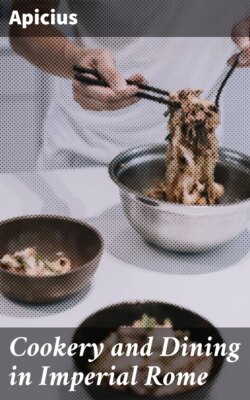Читать книгу Cookery and Dining in Imperial Rome - Apicius - Страница 18
На сайте Литреса книга снята с продажи.
Three Ancient Writers: Anacharsis, Apicius, Petronius
ОглавлениеTable of Contents
To those who lay stress upon documentary evidence or literary testimony, to those trusting implicitly in the honesty and reliability of writers of fiction, we would recommend Petronius Arbiter.
His cena Trimalchionis, Trimalchio’s dinner, is the sole surviving piece from the pen of a Roman contemporary, giving detailed information on our subject. It is, too, the work of a great writer moving in the best circles, and, therefore, so much more desirable as an expert. Petronius deserves to be quoted in full but his work is too well-known, and our space too short. However, right here we wish to warn the student to bear in mind in perusing Petronius that this writer, in his cena, is not depicting a meal but that he is satirizing a man—that makes all the difference in the world as far as we are concerned. Petronius’ cena is plainly an exaggeration, but even from its distorted contours the student may recognize the true lines of an ancient meal.
There is, not so well-known a beautiful picture of an Athenian dinner party which must not be overlooked, for it contains a wealth of information. Although Greek, we learn from it much of the Roman conditions. Anacharsis’ description of a banquet at Athens, dating back to the fourth century B.C. about the time when the Periclean régime flourished, is worth your perusal. A particularly good version of this tale is rendered by Baron Vaerst in his book “Gastrosophie,” Leipzig, 1854, who has based his version on the original translation from the Greek, entitled, Voyage du jeune Anacharsis en Grèce vers le milieu du quatrième siècle avant l’ère vulgaire par J. J. Barthélemy, Paris, 1824. Vaerst has amplified the excerpts from the young traveler’s observations by quotations from other ancient Greek writers upon the subject, thus giving us a most beautiful and authentic ideal description of Greek table manners and habits when Athens had reached the height in culture, refinement and political greatness.
Anacharsis was not a Hellene but a Scythian visitor. By his own admission he is no authority on Grecian cookery, but as a reporter he excels.
This truly Hellenic discussion of the art of eating and living at the table of the cultured Athenians is the most profound discourse we know of, ancient or modern, on eating. The wisdom revealed in this tale is lasting, and, like Greek marble, consummate in external beauty and inner worth.
We thus possess the testimony of two contemporary writers which together with the book of Apicius and with what we learn from Athenaeus should give a fair picture of ancient eating and cookery.
Apicius is our most substantial witness.
Unfortunately, this source has not been spared by meddlesome men, and it has not reached us in its pristine condition. As a matter of fact, Apicius has been badly mauled throughout the centuries. This book has always attracted attention, never has it met with indifference. In the middle ages it became the object of intensive study, interpretation, controversy—in short it has attracted interest that has lasted into modern times.
When, with the advent of the dark ages, it ceased to be a practical cookery book, it became a treasure cherished by the few who preserved the classical literature, and after the invention of printing it became the object of curiosity, even mystery. Some interpreters waxed enthusiastic over it, others who failed to understand it, condemned it as hopeless and worthless.
The pages of our Apiciana plainly show the lasting interest in our ancient book, particularly ever since its presence became a matter of common knowledge during the first century of printing.
The Apicius book is the most ancient of European cookery books. However, Platina’s work, de honesta uolvptate, is the first cookery book to appear in print. Platina, in 1474, was more up-to-date. His book had a larger circulation. But its vogue stopped after a century while Apicius marched on through centuries to come, tantalizing the scholars, amusing the curious gourmets if not educated cooks to the present day.
